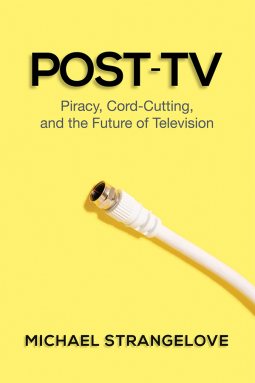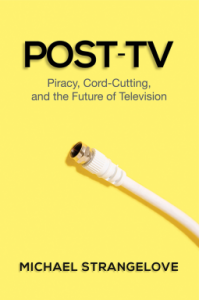
About Post-TV: Piracy, Cord-Cutting, and the Future of Television

In Post-TV, Michael Strangelove explores the viewing habits and values of the post-television generation, one that finds new ways to exploit technology to find its entertainment for free, rather than for a fee. Challenging the notion that the audience is constrained by regulatory and industrial regimes, Strangelove argues that cord-cutting, digital piracy, increased competition, and new modes of production and distribution are making audiences and content more difficult to control, opening up the possibility of a freer, more democratic, media environment.
A follow-up to the award-winning Watching YouTube, Post-TV is a lively examination of the social and economic implications of a world where people can watch what they want, when they want, wherever they want.
Review: Post-TV: Piracy, Cord-Cutting, and the Future of Television
We're a few steps away from the cord-cutting stage here in the Brown house, though we've almost tried it a time or two. I lived without live TV for a while a few years ago, only having a TV in the household to watch DVDs. I'm not sure I missed it, though I did go back to it eventually.
When our TV bust a couple of years back we decided to see if we could live without it. And we did, in the sense of the big box in the corner. We watched TV on our laptops or iPad, stopped playing on the consoles for a while (until we eventually sold them) in favour of PC and mobile games. Again, I'm not sure I missed it.
When we moved house, I bought a TV for David. I wasn't worried about mainstream programming or sticking to a TV schedule, so much as being able to sit together and watch a movie on a bigger screen. By that point, we were avid Netflix watchers, binge watchers of certain series from time to time. We missed our gaming too. Had I missed it? Not noticeably. Was it nice to go back to it? Yes, it was. We've changed the way we watch TV, worked out what works for us, something we probably couldn't have imagined doing a decade ago.
All this to say, I was very interested in the research and concepts behind Post-TV: Piracy, Cord-Cutting and the Future of Television. I thought it would be a fascinating insight into the way we watch TV now and how it is changing. I was right.
Strangelove examines a range of sources from research papers to online forums, from blogs and blog comments to conference speeches, from magazine editorials to white papers. His conclusion is clear: we are taking control of how we watch TV, instead of letting how we watch TV be controlled. From opting to binge watch via Netflix rather than follow a series week on week, to streaming or even pirating rather than sitting at home watching the 'Gogglebox', our habits are changing with startling rapidity. Post-TV covers the how and why in pretty remarkable detail.
Published by University of Toronto Press, it likely comes as no surprise that this approaches the subject of changing TV with quite an academic bent. Post-TV isn't dry and fusty, though, not by any means. Strangelove weaves in enough pop culture and anecdotal accounts to help counterbalance the research papers and staggering statistics.
This is a great read if you're interested in the changing way we absorb information, access entertainment and, yes, watch TV. Or don't as the case may be. I'm a long way from the cord-cutting commitment many others have taken, but this book leads me to believe it's not the far-fetched thing of the future that many (myself included at one time) might expect. If you want to understand the power of the consumer, Post-TV is a great place to start. Maybe the TV networks will even get around to reading this and acting on what the consumer wants, while there's still time to keep those cords in place...
Verdict: 5/5 Source: Netgalley
